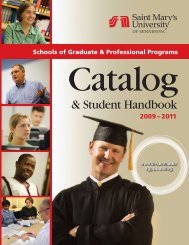PDF version - Saint Mary's University of Minnesota
PDF version - Saint Mary's University of Minnesota
PDF version - Saint Mary's University of Minnesota
Create successful ePaper yourself
Turn your PDF publications into a flip-book with our unique Google optimized e-Paper software.
Education<br />
ED101 Strategic Academic Reading 2 credits<br />
Strategic Academic Reading is designed to help students acquire critical reading and vocabulary skills<br />
for success in their disciplinary and general education course work. Students master college-level<br />
comprehension skills by reading for deeper understanding and retention, developing the habit <strong>of</strong><br />
referring to other sources for specific word meanings, and mastering research-validated individual and<br />
group study strategies for enhancing reading comprehension and academic success.<br />
ED102 Integrating Academic Reading and Writing 2 credits<br />
Students explore the integration <strong>of</strong> reading and writing strategies through the study <strong>of</strong> memoirs,<br />
culture-based readings, and content texts. This course is designed to help students develop the ability<br />
to articulate an effective thesis statement, identify supporting evidence in readings, and write in clear,<br />
grammatically correct language through comparing and contrasting the voices <strong>of</strong> minority writers in<br />
American society. Prerequisites: E105 or E120.<br />
ED250 Human Relations, Cultural Diversity and Indian Cultures 2 credits<br />
This course provides a general introduction to human relations, cultural diversity and Indian cultures<br />
as these concepts relate to teaching and learning in the K-12 classroom. Emphasis is placed on<br />
providing the students with additional knowledge, expertise or skills in creating a classroom learning<br />
climate conducive to supporting differences in cultural, ethnic, racial and gender backgrounds. Special<br />
emphasis is placed on gaining as understanding <strong>of</strong> <strong>Minnesota</strong> and Wisconsin Indian cultures.<br />
ED298 Field Exploration 2 credits<br />
This field exploration course is an intensive five-week engagement in the K-12 Lasallian Association <strong>of</strong><br />
Miguel Schools. Students work closely with teachers in support <strong>of</strong> teaching and learning in elementary,<br />
middle, and secondary educational settings. As part <strong>of</strong> their classroom and extracurricular placements,<br />
students conduct and analyze interviews with school administrators, classroom teachers, extracurricular<br />
staff, and other non-teaching personnel. Prerequisites: acceptance and enrollment in the Lasallian<br />
Teacher Immersion Program and consent <strong>of</strong> the chair <strong>of</strong> undergraduate teacher education.<br />
ED301 School and Society 5 credits<br />
The initial focus <strong>of</strong> this course emphasizes historical, philosophical, and sociological foundations <strong>of</strong><br />
education. Students examine connections between theory and practice on topics within the above<br />
mentioned areas. Topics include today’s students, teachers, school, teacher effectiveness, current issues,<br />
school reform, and pr<strong>of</strong>essionalism. A second focus <strong>of</strong> the course is an extensive filed experience where<br />
students observe and participate in elementary, middle, and secondary classrooms. Throughout the<br />
course an emphasis is placed on developing skills in human resources and the use <strong>of</strong> reflective practice<br />
in teaching. Offered fall semester. Prerequisite: concurrent with ED302.<br />
ED302 Substance Abuse Prevention and Community Health 1 credit<br />
This course is a general introduction to the effects <strong>of</strong> substance abuse and provides basic familiarization<br />
with chemical and public health education programs in the school and community. The course<br />
is designed to meet the <strong>Minnesota</strong> statue for obtaining a teaching license. Offered fall semester.<br />
Prerequisite: concurrent with ED301.<br />
ED306 Learning and Development 5 credits<br />
This phase <strong>of</strong> the Teacher Education Program focuses on the K-12 student as learner. The concept <strong>of</strong> learner<br />
is examined from a variety <strong>of</strong> applied areas in educational psychology. Principles <strong>of</strong> teaching and learning<br />
are developed in the context <strong>of</strong> learning theory, teaching effectiveness, learner differences, and child and<br />
adolescent development. Students engage in the central question: “What do highly effective teacher<br />
leaders know, think and do with respect to learning, development and learner differences?” Students<br />
also observe, participate and engage in a clinical field experience for five weeks in a single classroom<br />
translating theories <strong>of</strong> learning and development into methods <strong>of</strong> classroom practice while continuing<br />
96
















